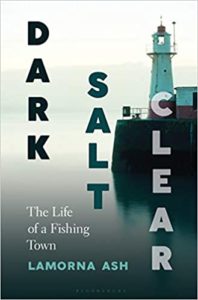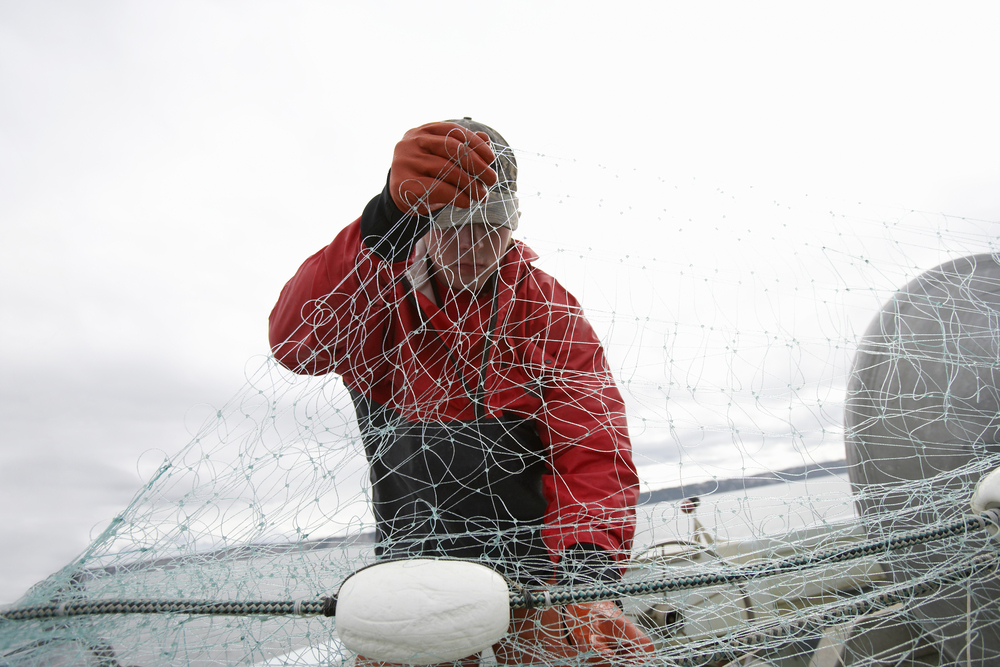What’s the best way to really learn about life in another community? Is it ever possible for industry to really connect with a community? In this episode, author Lamorna Ash describes her experiences in a Cornish fishing villages- and time spent working on a trawler- to EconTalk host Russ Roberts.

Ash first visited a Cornish village to to learn how fishing impacted the community, but the village became much more to her, including as the subject of her book, Dark, Salt, Clear. We hope you’ll help us continue the conversation- here in the Comments, or perhaps on your own offline. Either way, we love to hear from you.
1- What surprised you most about Ash’s description of life and work on the trawler? Roberts notes the lack of automation. Why do you think there seem to have been relatively few technological advances in this industry?
2- Why does Ash suggest that seasickness might be more psychological than physical? What doe she mean when she says it depends on “the relationship to the world you left behind?” Can you think of a similar phenomenon from another line of work?
3- What does Ash think is the most important thing she learned through this experience? What’s a similar experience you have had, and how did it change you?
4- Ash and Roberts talk a great deal about the trade-offs of economic growth, particularly in small towns such as the one in Ash’s book. Roberts says, “Creative destruction, technological change. All these things that lead to a higher standard of living, international trade, also affect your sense of self, your sense of place. It’s disruptive.” how do we know when enough is enough, or how can we help the retired fisherman working at Tesco from falling into despair?
5- How do fishing quotas help solve the tragedy of the commons? Given Ash’s description, how likely do you think it is that the younger generations of fishermen will focus more on sustainability than the old?
Fun Bonus Question: Ash tells the story of her trawler nickname, Raymundo. What would your nickname be, and why?)


READER COMMENTS
John Alcorn
Feb 17 2021 at 11:01pm
1. I expected fuller description of life on the trawlers (but enjoyed the other topics!). I lived two years in Sicily, in a little seaside town — partly a fishing village, partly a beach town. (I was teaching at the U. of Palermo and doing archival research about early history of mafia and social strife). I liked to linger occasionally at the boats and make conversation with fishermen as they did light chores. People are responsive when you patiently take disinterested interest in their work. So I wasn’t surprised at Ms. Ash’s account of fishing — the small boats, the lack of automation. But other towns (e.g., Sciacca, on Sicily’s ‘African Coast’) had a more ‘industrial’ fishing sector, with canneries, too. The coexistence of quite different firms and segmented markets is fascinating.
2. You can prevent or reduce motion sickness by concentrating on environmental reference points (e.g., a fixed point on the horizon), to find your perceptual bearings. Metaphorically, the world you left behind is a horizon. Astronauts are another example. Some amusement park rides are designed to challenge the rider by disorientation.
3. Ms. Ash mentions several specific lessons: how to gut fish, how to drink, awareness of her London identity, how to listen, and the charm of relaxed, familiar love. My intuition: A week or two on a trawler as a participant-observer on a writing assignment doesn’t really change a struggling young writer; but overcoming writer’s block to complete a fine book about the experience does.
4. Once upon a time, I would have replied that people will tell us when enough is enough, by voice or exit. The recent phenomenon of deaths of despair, partly correlated with fallout from automation and trade (globalization) reminds me that a rising tide lifts most boats — but not all. A complication is the mix of (a) increasing disinclination to migrate to opportunity and (b) increasing barriers to entry in housing and in skilled employment where there would be opportunity.
5. Fishing quotas prevent long-term depletion of fishing stocks, and balance present and future needs. It sounds like young fishermen will try and specialize in niche markets, the equivalent of ‘farm to table.’ Fishing, politics, regulations, and subsidies will continue to go hand in hand.
Sinker!
Amy Willis
Feb 23 2021 at 7:18am
Sinker, lol! I think mine is Chicken…
Scott Weigle
Feb 19 2021 at 9:58pm
This episode was compelling listening. I had read the Elizabeth Bishop poem after the recent episode with the poet wherein it was mentioned that the title of this guest’s book was drawn from “At the Fishhouses.” So I knew I had to listen to this one.
I grew up on a small farm outside of a small town in Idaho. The old ex-fishermen who could not separate from their life on the sea made me think of a short poem. It was written by one of my friends from a nearby town when he was in college. As far as I can determine it has never been published (until now, I guess, sort of!).
Beet Harvest Blues
so the old man rambles,
rambles on and his talk
fills the storefront porch
and the crop was huge
huge by God in ’52, ’53
never one like it since
prices damn low
government today
no honest man could
ah but then,
then by God
he smokes
young men listen and
old men listen and
trucks full of harvest
rumble by
~ Shawn Vestal
Amy Willis
Feb 23 2021 at 7:18am
This is so lovely, Shawn. Thanks for sharing!
Scott Weigle
Feb 19 2021 at 10:02pm
Near the end was a mention of another podcast (guest, Michael Blastland, unsure of spelling) who was relating some aspect of Brexit and is quoted as talking to a person about GDP…”It’s your bloody GDP, not mine.”
I’m very interested in that episode but can’t find it. I’ve listened to “The Hidden Half” with Michael Blastland, but that is not about Brexit.
I would appreciate any guidance you can provide. Thank you.
[It might’ve been the Lamorna Ash or Matthew Crawford episode at https://www.econtalk.org/lamorna-ash-on-dark-salt-clear/
Or
https://www.econtalk.org/matthew-crawford-on-why-we-drive/
I think Russ was quoting Blastland quoting someone else from somewhere else.–Econlib Ed.]
Amy Willis
Feb 23 2021 at 7:21am
Hi, Scott, it is the Crawford episode, about halfway through. But you’re right, Russ was in fact quoting Blastland there.
Scott Weigle
Feb 20 2021 at 12:32pm
1 (and 5 as well). Lack of automation: Fishing quotas is my best guess. Look at the opposite extreme: If there were no limits on the fish harvest, you can bet there would be huge, modern, highly-automated trawlers scraping up everything until it was gone. The return for that kind of investment isn’t high enough with quotas.
I don’t know how quotas work, but I suspect if it was possible for individual fishermen to sell their allotment, as farmers in the American West can sell their shares of water independent from the land, then by now a large corporation would have consolidated them and you’d see the mega trawlers.
Individual existing boats are not more automated since to do so is probably much more expensive in initial outlay and maintenance than paying humans. And maybe community pressure?
2. I’d say there is a psychological element to it…a young boat-hand on a family-owned fishing charter told me he had gotten so desperately ill as a child that he would get “seasick” when he was standing on the dock looking at the boat.
4. Note the Biden administration’s emphasis when outlining their rural infrastructure plans: Structured in a way that won’t require people to uproot themselves and separate from family and location.
It may only slow the inevitable decline, but politicians are becoming more astute about the issue; it’s not a long-term financial good to allow a section of the country to fall into poverty knowing people won’t leave, will suffer poor health, and even addiction, thereby drawing in vastly more support resources for decades than they will ever pay in tax dollars. Better to spend that money upfront in some way to help change the direction of the local economy, or at least try.
Despair is combated by helping displaced people found another source of pride in their work and existence. Maybe it won’t be as salt-of-the-earth as the old way of life (e.g., a transition to eco-tourism), but at least they won’t be surrounded by dilapidated reminders of past glories and a feeling of being a drag on the rest of society, looked down on by supposed elites for their low condition.
This is not easy to do, but I’m constantly struck by the lack of imagination in coming up with innovative policy solutions to help. The tax code provides a way, perhaps – setting up low-or-no-tax enterprise zones that last a decade or whatever and encourage young people to try all manner of new businesses until something sticks and grows. Encourage people to move to the area rather than encouraging the existing people to move out. If the incentives are right, they will come.
Trevor Comeau
Mar 13 2021 at 10:08am
I grew up on Digby Neck, NS, Canada in a small fishing village called Trout Cove and this podcast really brings back memories.
I started fishing with my father at 14 in 1987. We gill-netted for herring to sell as bait or to smoke for kippers. At 17 I started scallop fishing over the summer and holidays. We’d usually do 5-8 day trips and run the boat around the clock. You had 3 groups of men and every 4 hours one would turn in and one would get up.
You’d have to settle for a sponge bath every few days and the loo was a 5 gallon pail outside in a secluded corner of the boat.
My parents were very happy to see me leave and get an engineering degree and not go back.
What Lamorna says during the podcast is so relatable. Some of the terms we used are different but the themes are all the same. From sea-tox to the relationships.
At 47 I’d like to do a 2-3 day trip but I’d probably regret it when the aches and pains came along.
Comments are closed.